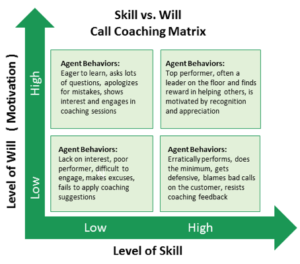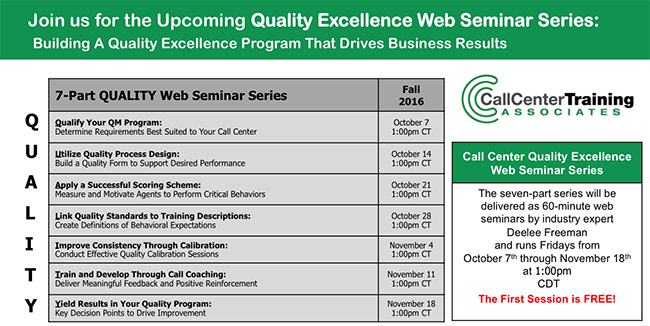Lack of Skill or Lack of Will?
Adapt Your Call Coaching Method Accordingly!
By Deelee Freeman, Call Center Training Associates
[one_half]One of the greatest challenges in call centers is keeping the frontline staff trained on the ever-changing dynamic of the call center environment and motivated to deliver the highest level of service on every call. What ultimately makes the greatest impact on agent development and customer service? It is effective coaching. A good quality monitoring program that includes evaluation of call recordings and subsequent coaching sessions can help turn a call center that seemingly doesn’t really care about its customers into a call center where customers can count on the staff to do everything they can to resolve every concern the customers bring.
What determines effective coaching? There is no one size fits all when it comes to coaching because agents under-perform for different reasons. It we can get to the root cause of the poor performance, and address the cause rather than coaching to the symptoms, then there is a far greater chance of agent buy-in and success.
When we peel back some of the layers of poor performance and uncover the reasons why agents struggle to perform, we can typically separate the poor performers into two categories. For one group, it’s a matter of skills, for the other, a matter of will (not).
Coaching for “Lack of Skill”
We put agents in the “lack of skill” category when it becomes clear that they either truly do not understand the performance expectation in a given area, or perhaps they understand what is expected but struggle to perform because they just don’t know how. Fortunately, these cases can be some of the easiest for the coach to make a positive change. Typically, the coach would follow these steps:
- Find out just what is unknown. If they are unaware of what is expected of them, then clarify the performance expectations. If it’s a knowledge gap, show the agents where to find the information or how to present that information clearly to resolve the customer’s issue.
- Provide tools to help the agents retain information. For example, coaches can work with agents to create visual cues or reminders such as a note card with reminder notes to tack on their cubicle wall until they are able to recall the information by memory. Adult learners have different learning preferences: some are visual, some auditory, and others kinesthetic. If you are not familiar with these three learning styles, it’s easy enough to do a quick web search and brush up on your knowledge of these so you can provide a variety of ways to teach your agents new skills during your coaching session, based on how they learn best.
Coaching the Will (Not) Agent
Not everyone who struggles to perform does so because they don’t understand what is expected of them or they don’t have the skills or knowledge to handle the caller’s request. Sadly, some agents simply don’t care. They are not motivated to learn or to even try to provide good service. They do what is minimally expected of them without thoughts of how they could do better. During coaching sessions, they may nod their head in agreement but know deep inside they do not intend to change. They simply hope they won’t get caught in the future, believing that quality monitoring is just a crap shoot anyway and, based on the large number of calls they handle, only a few will ever be monitored. These willful under-performers are a coaching nightmare and leave coaches feeling discouraged and left questioning their own abilities because they see such little progress with these types of agents. The first issue is how to identify those that will not.

[/one_half]
[one_half_last]
As coaches, it’s important to give our agents the benefit of the doubt in the beginning of our coaching experience with them. This shows that we believe in them and trust that they are striving to improve. Start with clarifying the expectations of frontline performance and ask lots of questions to discern their knowledge of products and procedures. Isolate the behavior and/or skill then show them how. It’s what happens next that reveals if it’s a case of skill or will (not). In the first 24 hours after your coaching session, observe them applying their new knowledge and provide immediate reinforcement. If you find they are not showing improvement, bring them right back in for follow-up and discuss the consequences to their lack of performance, especially now that you see they know how but are just choosing not to do it.
Consequences Should be Positive and Immediate
Consequences are a heavy determinant in shaping behavior and promoting good performance. People either do or don’t do something because of what they believe will happen to them afterwards. When agents perceive that nothing really happens to them whether they do or don’t do something, they are less motivated to perform to their potential. The more impactful consequences are positive and immediate. This is why effective coaches are those who realize the coaching session is not completed until there is follow-up observation and a post-coaching session to provide feedback.
For agents eager to learn and receptive to SKILL-coaching, their post-coaching session feedback will consist of positive reinforcement which is incredibly motivating as they work to apply new skills. For those agents who do not apply the coaching suggestions, it is essential that you set up a regimen of follow-up coaching so the WILL NOT agents realize they are accountable for their performance. When applied consistently, you will find that for many agents who fall into the low performing category, the reality of consequences will influence their behavior and correct their apathy. Once they begin performing and thus begin receiving a steady stream of positive reinforcement, they, too, will catch the wave of motivation that comes with this method of applied consequence.
And now for the harsh reality. Inevitably, there will be a few who simply will not respond to either your coaching efforts or the consequences, no matter how often you apply them. They will not buy-in or try because they just don’t care enough about the job, the call center, or your customers. In these few cases, the reality is they were probably a bad hire to begin with and not a good fit for your call center. The best thing you can do in these cases (hopefully they are rare) is to help them find a job somewhere else that will be a better fit. In other words, you need to have the courage to do what is right for your call center and manage them out as soon as you are able and with as little disruption to the others as possible. While this is the ultimate consequence, it will create the best outcome, both for your call center and for the individual. It is fair to say no one is happy in a job they don’t do well.
The key to effective coaching, then, is being able to switch strategies based on whether the session is primarily SKILL-coaching or WILL-coaching. Coach your coaches to make it their standard practice to follow-up on each session with additional observations in attempt to “catch agents doing it right” so there will be opportunities for provide positive reinforcement. In the cases where an agent willfully does not perform, take action immediately. Place the agent on a high-impact coaching plan where there are clear consequences associated with the will not performance. Above all, be intentional about creating a call center culture where positive, immediate consequences are common and agents feel their efforts are noticed. That way, they will be motivated to not just meet expectations but exceed them!
Interested in learning more about coaching best practices and other important topics to help you build a program for Quality Excellence? Join us for the Fall 2016 QUALITY Excellence Web Series to help your quality specialists, supervisors, and even call center managers better leverage quality monitoring and call coaching to impact your call center business. Register today at www.qatc.org.
Deelee Freeman is the Director of Call Center Training Associates, providing training and consulting services for call centers. She can be reached at 404-630-2156 or dfreeman@callcentertrainingassociates.com.
[/one_half_last]

